SEO Meta in 1 Click is a well-known Chrome extension that delivers immediate insights into a webpage’s metadata structure. It offers an efficient way to check titles, descriptions, headings, and indexing tags.
It’s a practical and fast-loading tool for digital teams managing lean workflows. However, as SEO strategies become more data-driven and complex, the need often arises for tools with deeper analytical capabilities, broader integrations, or advanced reporting features.
This is where you may need an alternative SEO extension. Whether the priority is conducting competitive SERP analysis, exporting bulk audit data, or enhancing technical diagnostics, there are numerous Chrome extensions tailored to specific SEO needs.
Understanding which tool suits a business’s structure, maturity, and goals requires evaluating functionality through a focused lens.
The following sections will explore what to look for in an effective SEO browser extension. We’ll also introduce a curated list of powerful alternatives for more optimization workflows.
Table of Contents
What to Look For in a Good SEO Extension
Choosing the right SEO extension is about precision, compatibility, and long-term ROI. You need tools that not only analyze but also fit seamlessly into broader operational and marketing processes.
Below are key features to evaluate when assessing SEO extensions:
- Comprehensive On-Page SEO Analysis: The extension should scan and surface metadata, headings, canonical tags, image alt text, and indexing directives in a structured, accessible format.

- Real-Time SERP Data Enhancements: Ideal tools overlay additional metrics like domain authority, backlinks, or traffic data directly into SERPs, supporting fast competitor benchmarking.
- Integration with Third-Party SEO Platforms: Smooth integration with tools like Ahrefs, Moz, SEMrush, or Google Search Console will allow more actionable insights across campaigns.

- Export and Reporting Capabilities: Look for extensions that offer downloadable reports in CSV or PDF formats. It will help document SEO audits or share findings with teams.
- Performance and Lightweight Load: A bloated extension can slow down browser activity. Lightweight tools that load instantly without lag are preferable for continuous use.
- User Interface and Accessibility: The layout should be intuitive, with collapsible sections, color-coded highlights, or tooltips to streamline interpretation, especially for non-technical users.
- Security and Update Frequency: Frequent updates and transparent privacy practices will ensure long-term reliability and alignment with algorithm changes or browser updates.
The Top 10 Alternatives to SEO Meta in 1 Click
The alternatives we’ve listed below cater to different business needs, from enterprise SEO teams to freelancers. Each tool here is selected based on real-world usability, data granularity, and compatibility with professional SEO workflows.
What follows is a breakdown of the 10 top-performing extensions that serve as viable or even superior substitutes, depending on the context.
MozBar
MozBar, developed by Moz, remains a longstanding favorite in the SEO community. Designed to assist with SERP analysis and authority checks, this extension overlays key metrics onto search results and webpage views in real time.
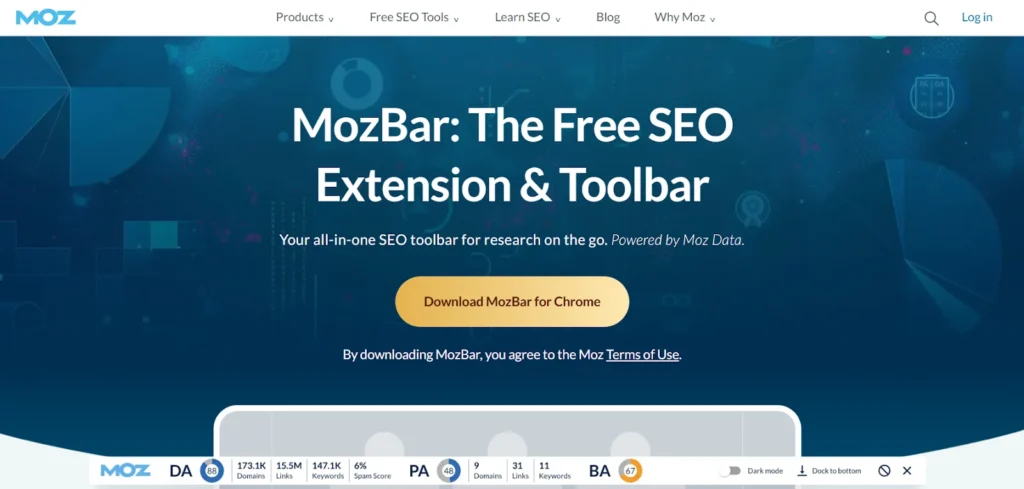
Core Functionalities
- Displays Domain Authority (DA) and Page Authority (PA) directly in SERPs.
- Highlights follow/no-follow links.
- Provides on-page analysis for meta tags, headers, and HTTP status codes.
- Allows exporting SERP data to CSV (premium).
- Custom search location and engine configurations.
Pros and Cons Table
| Pros | Cons |
| Trusted brand with robust DA/PA data | Limited in-depth on-page analysis |
| Real-time SERP overlays | CSV export is locked behind a paywall |
| Clean UI for authority comparisons | Lacks integration with external audit tools |
MozBar is ideal for digital marketers, content strategists, and businesses prioritizing authority metrics and competitor benchmarking. It fits particularly well in campaigns that hinge on link-building and domain health monitoring.
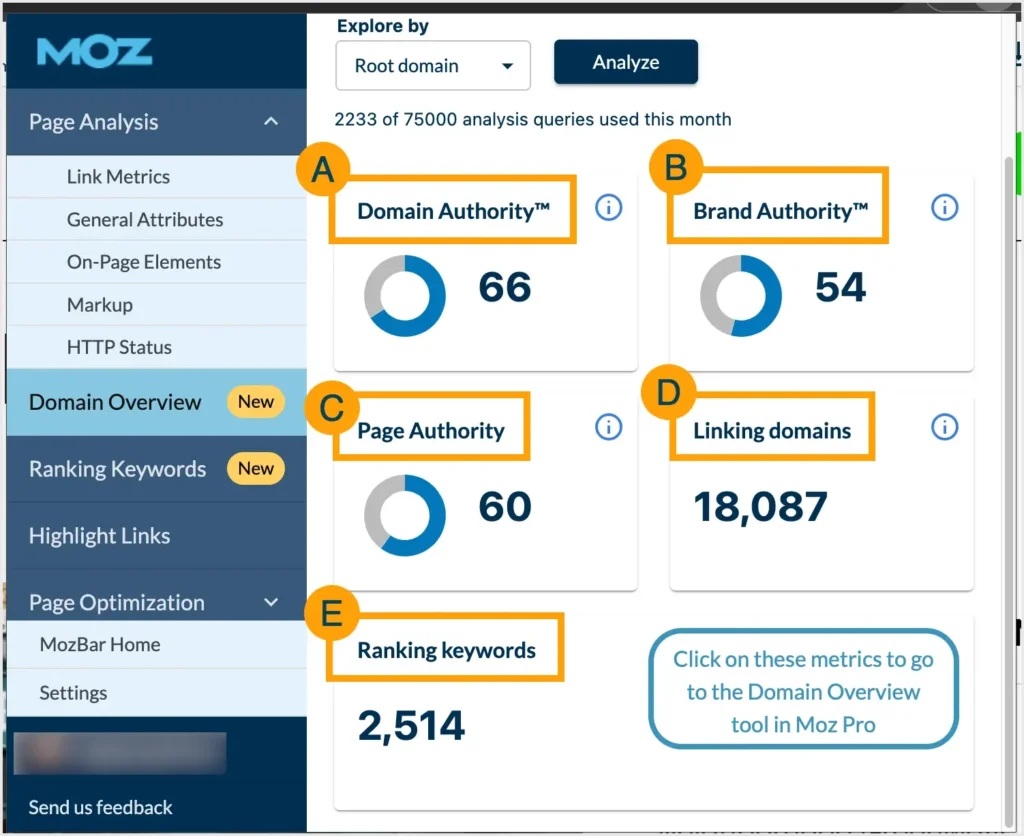
Source: Moz
However, Mozbar is a better supplementary tool for technical SEOs seeking schema, internal linking, or canonical tag data at scale.
Ahrefs SEO Toolbar
Ahrefs’ SEO Toolbar is a powerful browser extension packed with technical and backlink insights pulled from Ahrefs’ proprietary index. It merges real-time on-page diagnostics with actionable link profile data.
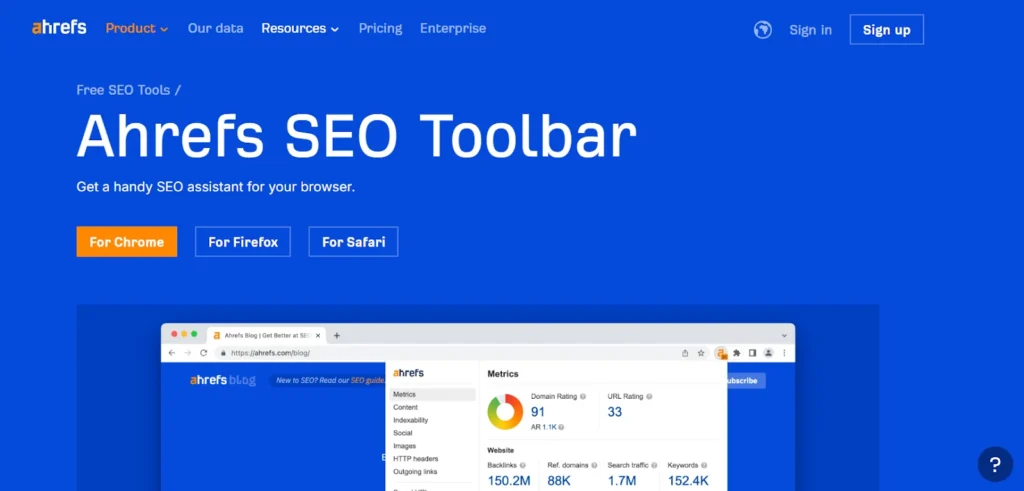
Core Functionalities
- Pulls Ahrefs metrics like UR, DR, backlinks, and referring domains.
- Identifies on-page issues like missing meta tags or incorrect canonical tags.
- Highlights outgoing/internal links and broken links.
- Integrates with the Ahrefs platform for deeper exploration.
- Works in both SERPs and page-level audits.
Pros and Cons Table
| Pros | Cons |
| Rich link profile data from Ahrefs’ database | Requires an Ahrefs subscription for full access |
| On-page and SERP integration in one | May feel heavy for quick checks |
| Clean UI and fast data load | Limited non-link related diagnostics |
The Ahrefs SEO Toolbar best suits businesses investing in backlink strategies, competitive analysis, or ongoing content health assessments.
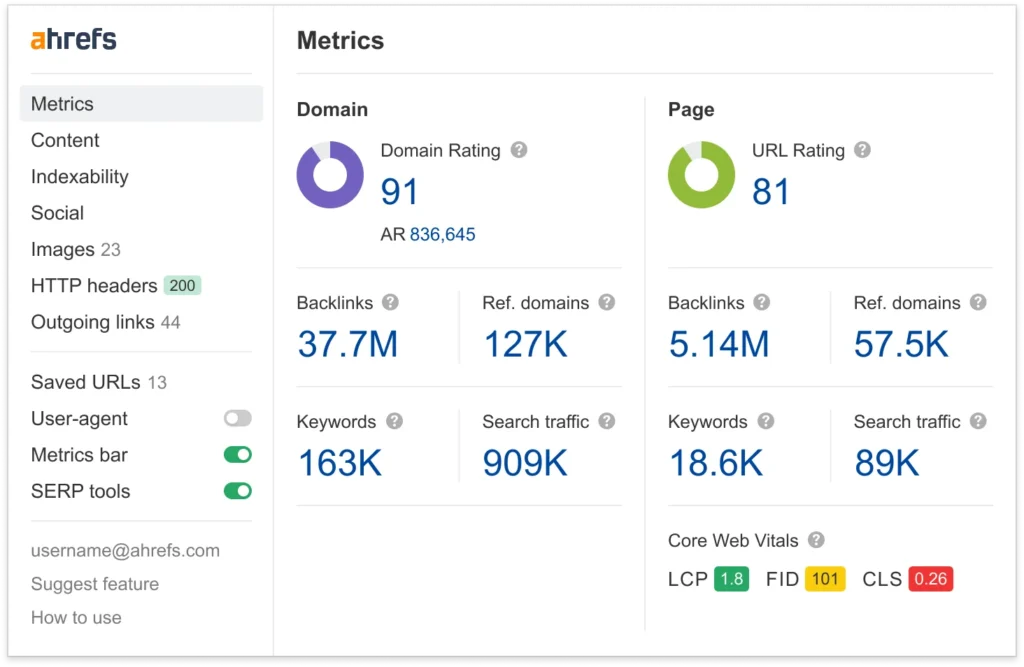
It supports agencies and mid-to-large businesses running multi-channel campaigns that already rely on Ahrefs. However, the cost may not justify it for teams that don’t prioritize link data or who prefer lightweight UX.
SEOquake
SEOquake, developed by Semrush, offers a data-dense SEO auditing experience right from the browser. It combines page-level diagnostics with SERP-level analysis, making it ideal for rapid research and deep technical audits.
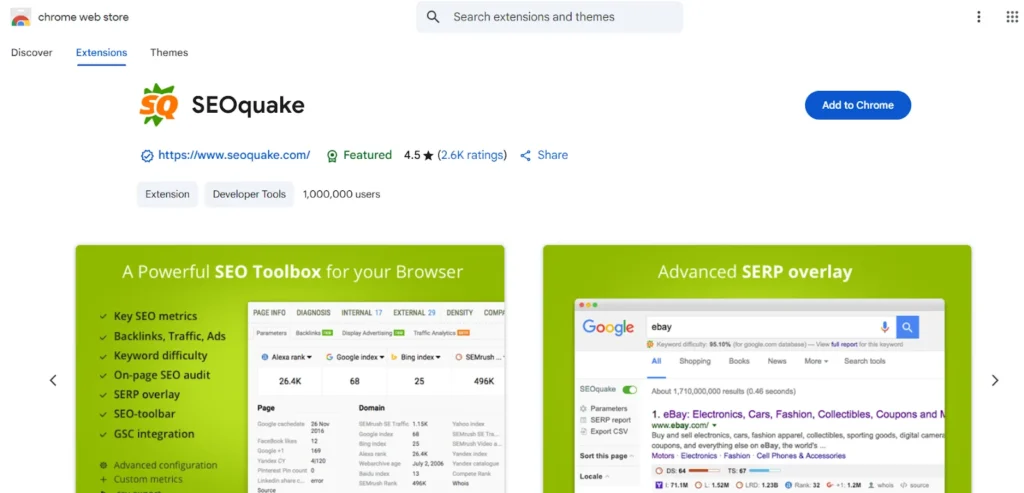
Core Functionalities
- Displays a broad SEO dashboard including meta data, internal/external links, density analysis.
- Adds an SERP overlay with metrics like SEMrush rank, backlinks, domain age.
- Supports parameter customization and CSV export.
- Includes page comparison and mobile compatibility reports.
- Integrates with SEMrush for extended features.
Pros and Cons Table
| Pros | Cons |
| Deep technical audit capability | Interface may feel cluttered for new users |
| Strong SEMrush integration | Not ideal for minimalists or quick scans |
| Highly customizable with export options | Some metrics limited without SEMrush account |
SEOquake is particularly effective for businesses conducting keyword research, competitor audits, and multi-layered technical evaluations. It favors SEO professionals and teams already embedded within the SEMrush ecosystem.

While its UI can be overwhelming, its feature-rich environment justifies the learning curve for serious analysts.
Detailed SEO Extension
Built by Glen Allsopp of Detailed.com, the Detailed SEO Extension focuses on precision and speed. It offers clear-cut on-page data for fast SEO decisions, and its layout emphasizes immediate utility over bulk analysis.
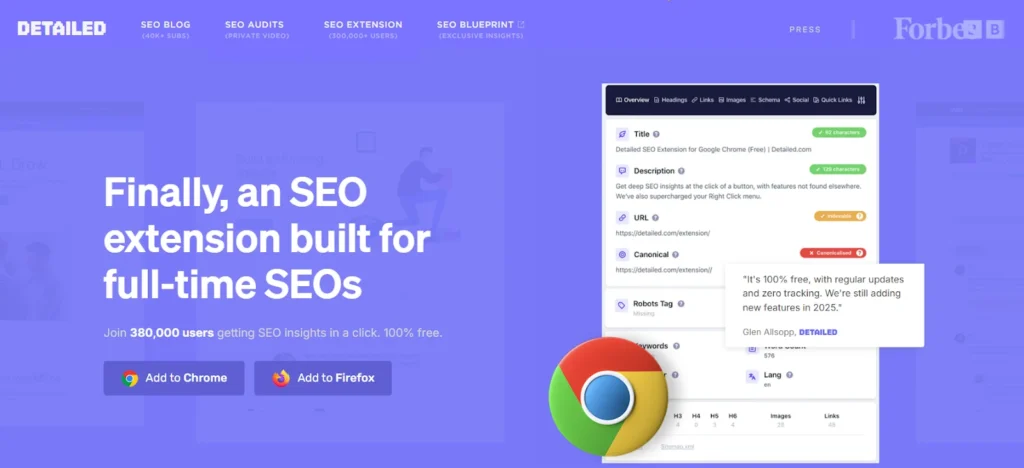
Core Functionalities
- Shows title tag, meta description, canonical tag, and robots directives instantly.
- Highlights all heading tags (H1–H6) and their structure.
- Offers a clean layout to view schema.org markup and open graph data.
- Focuses strictly on on-page elements without visual clutter.
- Loads extremely fast compared to multi-purpose tools.
Pros and Cons Table
| Pros | Cons |
| Exceptionally fast and lightweight | No integration with other SEO platforms |
| Zero learning curve, intuitive interface | Lacks backlinks or performance metrics |
| Reliable for immediate on-page diagnosis | Not designed for large-scale audits |
This tool is best for solo consultants, content-focused marketers, or businesses that need quick diagnostics without diving into server-side or link-related data.
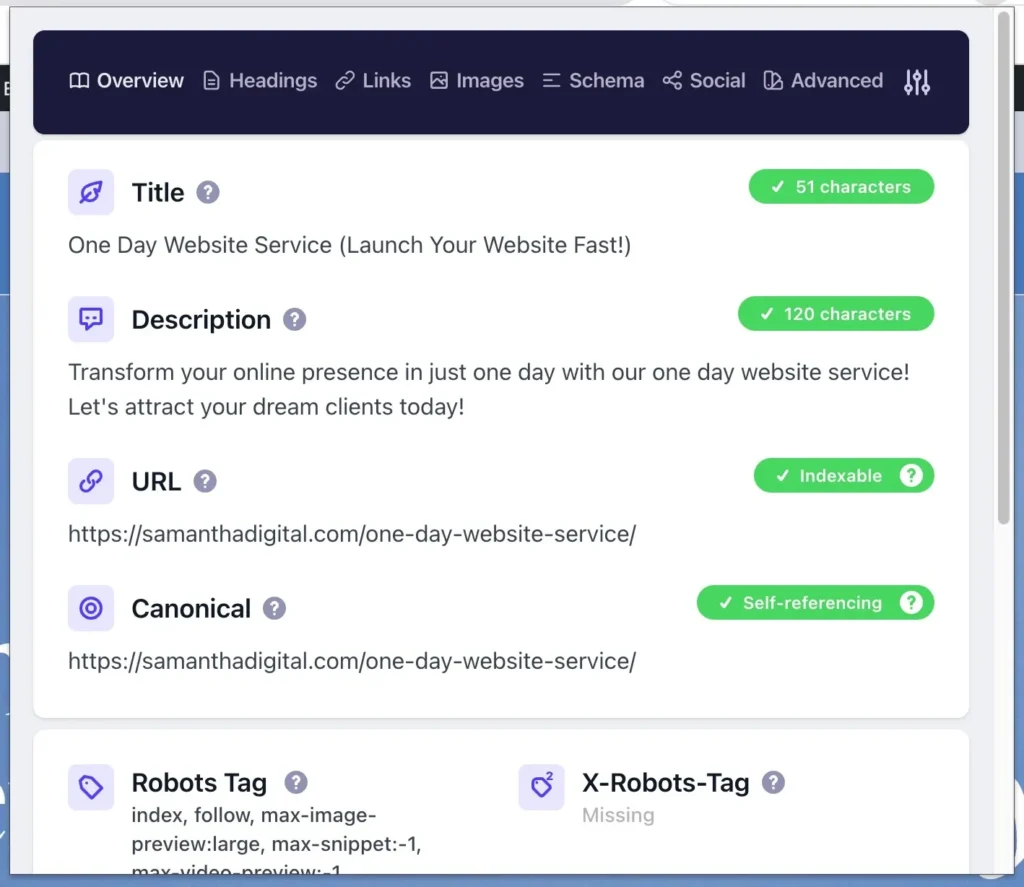
Its lightweight nature makes it perfect for frontend reviews and copy optimization workflows, though it’s best complemented by deeper SEO platforms for a comprehensive strategy.
Checkbot
Checkbot is a unique SEO extension that emphasizes performance, security, and best practices compliance across entire websites rather than single-page analysis. It scans hundreds of URLs simultaneously to deliver insights more aligned with technical SEO audits.
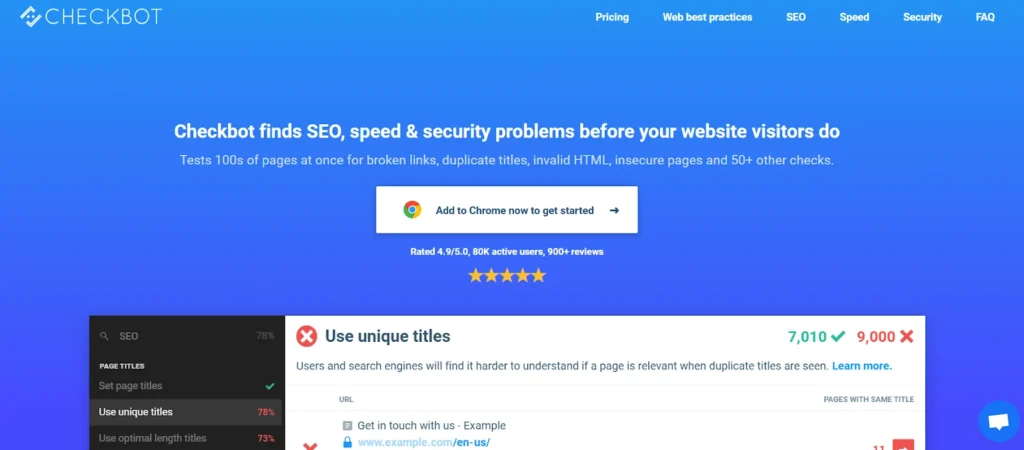
Core Functionalities
- Crawls up to 100 URLs in the free version.
- Checks for broken links, duplicate content, and redirect chains.
- Audits HTTPS setup, security headers, and canonical tag use.
- Offers performance checks based on Google best practices.
- Classifies issues by severity and SEO category.
Pros and Cons Table
| Pros | Cons |
| Full-site auditing capability in-browser | Doesn’t show keyword data or off-page metrics |
| Strong focus on technical and security compliance | The interface may overwhelm smaller businesses |
| Includes export and prioritization features | Requires upgrade for advanced features |
Checkbot is best suited for developers, technical SEOs, and businesses preparing for site-wide overhauls or launches. Its scanning capabilities and severity-based issue tracking make it excellent for catching structural flaws at scale.
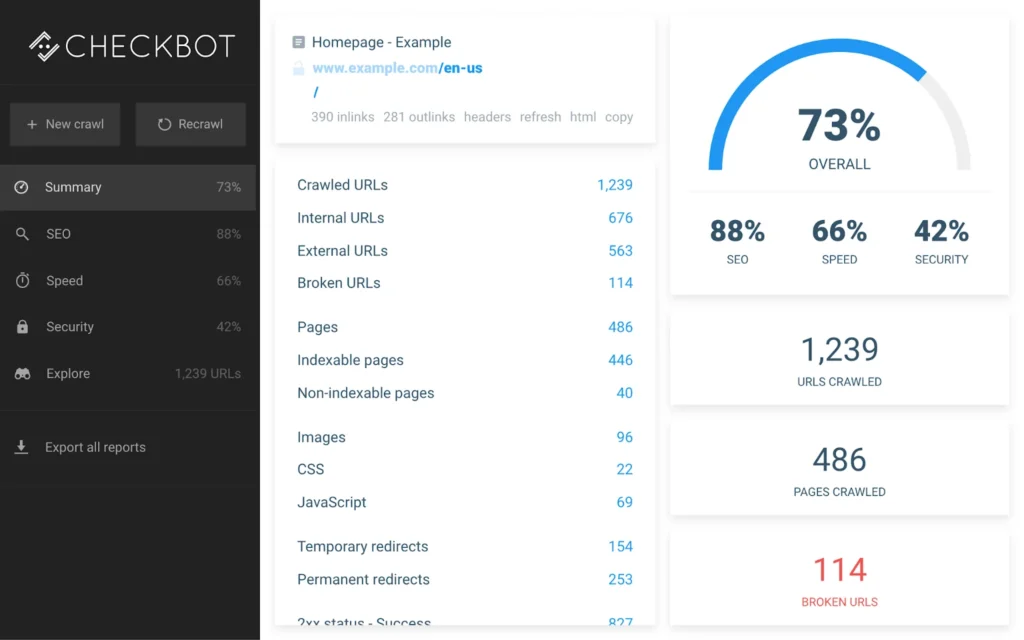
It’s less helpful for content strategy or SERP analysis, but invaluable during the pre-launch audit phase.
Woorank Extension
The Woorank SEO & Website Analysis extension condenses Woorank’s web-based audit tool into a compact sidebar. It combines SEO, usability, and mobile optimization insights into an all-in-one snapshot.
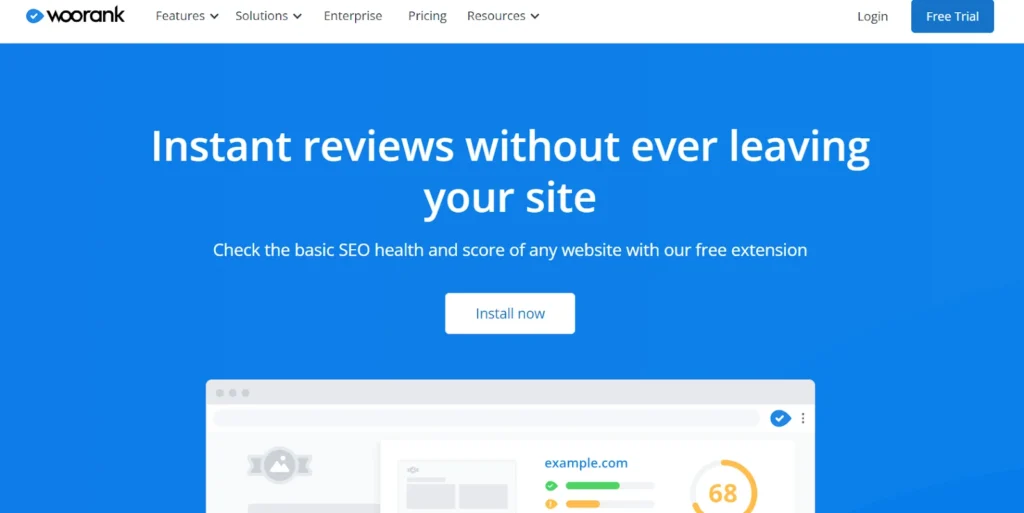
Core Functionalities
- Highlights metadata, content length, indexing status, and mobile-friendliness.
- Reviews page performance, social sharing data, and usability issues.
- Suggests actionable improvements categorized by priority.
- Provides real-time data for each page visited.
- Integrates directly with the complete Woorank platform.
Pros and Cons Table
| Pros | Cons |
| Balanced view of SEO, usability, and performance | Limited link analysis and schema depth |
| Actionable recommendations with context | Full report access requires an account |
| Lightweight overlay for quick decision-making | Slight delay in report generation |
This extension fits well with businesses valuing a holistic page health approach. It’s ideal for digital marketing teams, small business owners, and content leads seeking a blend of SEO and UX checks.
However, for more advanced users seeking crawl-level diagnostics or backlink data, it may require pairing with other tools.
Lighthouse (Chrome DevTools Built-in)
Lighthouse is a free, open-source tool built into Chrome DevTools. It is primarily designed for performance, accessibility, PWA audits, and technical SEO. While not a standalone extension, its availability within the browser makes it a powerful diagnostic asset.
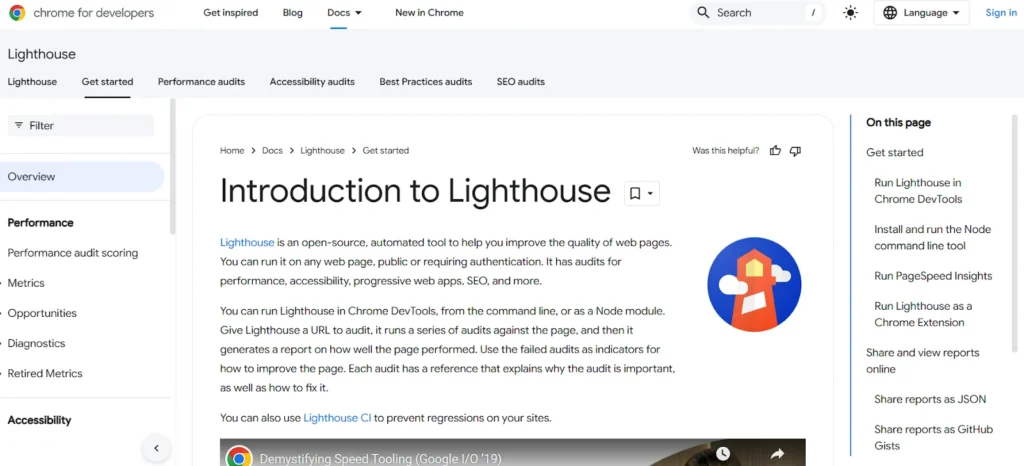
Core Functionalities
- Audits for performance, accessibility, best practices, and SEO.
- Generates detailed reports with scoring and improvement suggestions.
- Highlights mobile-friendliness, structured data, and viewport configuration.
- Identifies render-blocking resources and unused JavaScript.
- Exportable in JSON and HTML for documentation.
Pros and Cons Table
| Pros | Cons |
| Native Chrome tool with zero installation needed | Lacks backlink or SERP-related insights |
| Ideal for performance and technical audits | Interface is not optimized for beginners |
| Highly detailed scoring with reproducible results | Doesn’t retain history or allow batch scans |
Lighthouse is best leveraged by developers, site speed optimizers, and technical SEO professionals looking to improve Core Web Vitals.
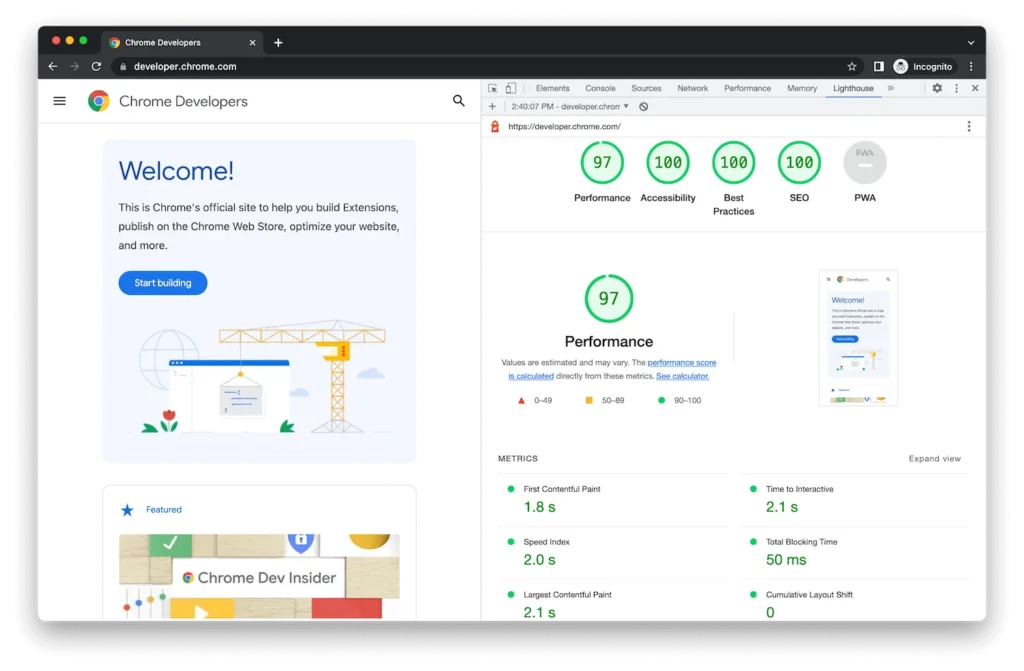
It offers a reliable baseline for businesses preparing for SEO updates tied to UX performance or mobile usability. However, it’s not intended for keyword research or SERP tracking.
Mangools SEO Extension
Mangools’ extension brings together features from its broader suite (KWFinder, SERPChecker, and SiteProfiler) offering a hybrid between SEO audit and keyword intelligence tools.
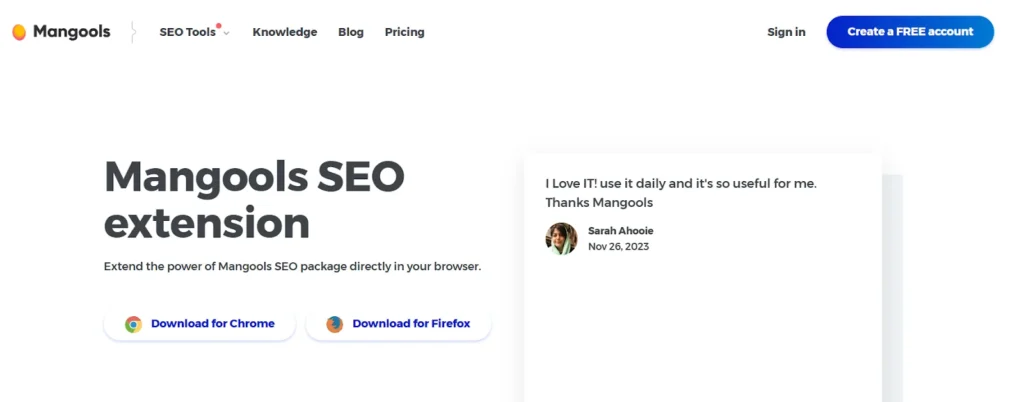
Core Functionalities
- Provides Moz-style authority scores (DA/PA), backlinks, and referring IPs.
- Displays keyword difficulty, search volume, and CPC within SERPs.
- Offers insights into domain age, Alexa rank, and social signals.
- Highlights on-page SEO details like meta tags and headers.
- Seamless linking with Mangools suite for deep-dive analysis.
Pros and Cons Table
| Pros | Cons |
| Combines keyword data with SEO metrics | Requires Mangools subscription for full access |
| Fast-loading SERP overlays and on-page details | Not suitable for large-scale technical audits |
| Useful balance between research and optimization | Interface may feel basic compared to Ahrefs |
Mangools’ extension is a great fit for content teams, affiliate marketers, and SMBs who need consistent keyword insights alongside basic SEO health indicators.
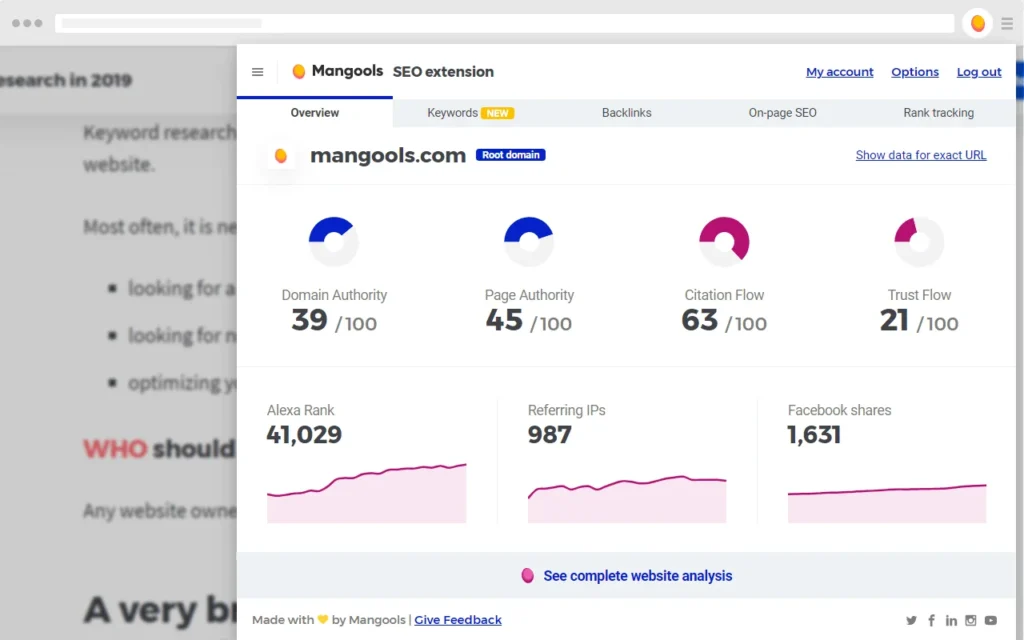
It performs exceptionally well for search-focused campaigns and niche site operators. While not technically exhaustive, it fills the gap between research and implementation fluidly.
Serpstat Plugin
Serpstat’s Chrome extension functions as a compact version of its full SEO and growth marketing platform. It emphasizes competitive intelligence and keyword metrics with a sleek user interface tailored to quick insights.
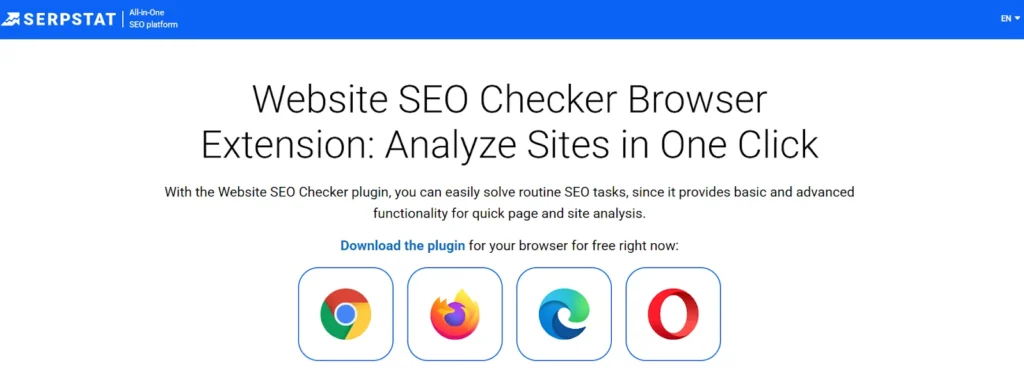
Core Functionalities
- On-page SEO analysis, including meta tags and headers.
- Shows domain visibility, traffic trend data, and backlink stats.
- Provides keyword volume, difficulty, and CPC estimates.
- Includes competitor research tools for domain vs. domain comparisons.
- Quick export options and one-click integration with the Serpstat dashboard.
Pros and Cons Table
| Pros | Cons |
| Excellent for competitive keyword benchmarking | Requires a paid account for full metric access |
| Integrates keyword and domain-level insights | UI can feel dense for quick-glance assessments |
| Good SERP analysis support and backlink data | Focused more on research than technical SEO auditing |
This extension is best for growth-focused SEO strategists and digital marketers running competitor-heavy campaigns.
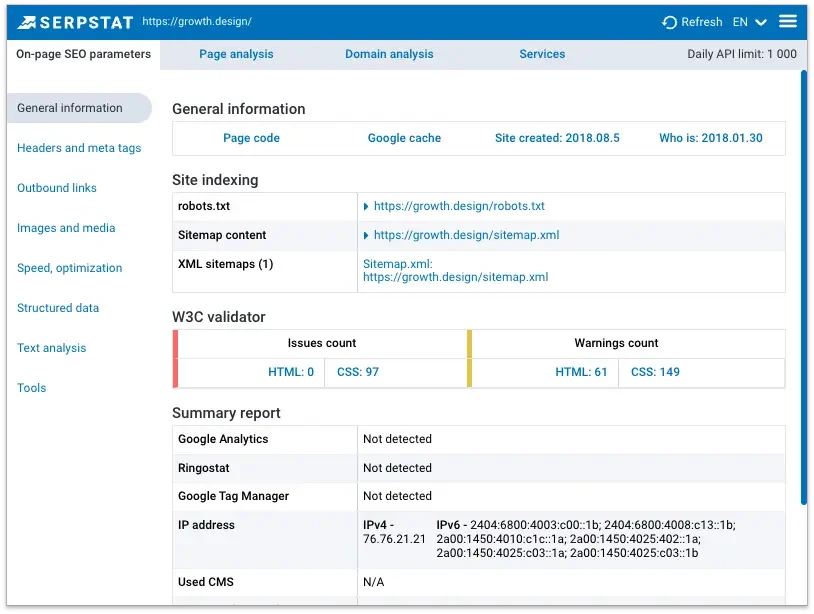
Serpstat’s PPC and SEO metrics integration makes it ideal for lead-gen businesses and agencies prioritizing fast keyword diagnostics over technical audits.
Link Redirect Trace
Link Redirect Trace by LinkResearchTools is engineered specifically for tracking redirection chains, link equity, and HTTP header analysis, an area often neglected by conventional SEO tools.
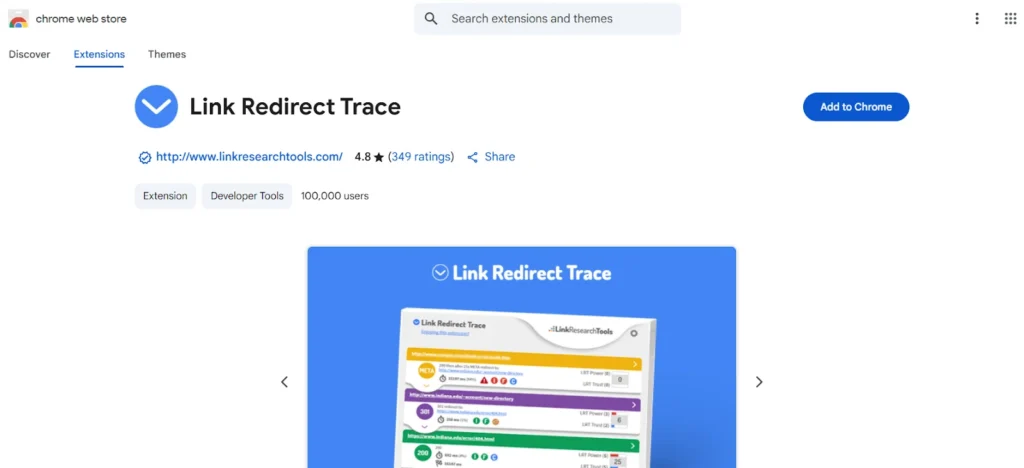
Core Functionalities
- Displays HTTP status codes and full redirect paths.
- Visual trace of all redirects, including 301s, 302s, meta-refresh, and JavaScript.
- Identifies canonical issues and indexability concerns.
- Displays security-related headers and potential HTTPS conflicts.
- Integrates with LRT Power*Trust metrics for backlink quality assessment.
Pros and Cons Table
| Pros | Cons |
| Detailed redirection flow and link equity tracking | Not useful for keyword or content-related SEO |
| Highly technical insights into headers and indexing | The interface may be too advanced for non-technical users |
| Effective for debugging canonicalization problems | Some metrics are locked behind a paid LRT account |
Link Redirect Trace is ideal for technical SEO specialists and developers involved in large migrations, complex site structures, or auditing backlink chains. It is particularly valuable in diagnosing visibility drops caused by redirection mismanagement.

Comparative Feature Table
Now that we’ve reviewed each of the top 10 SEO extensions, it’s time to put them into perspective with a comparative feature table. This overview will allow a clearer understanding of which tool offers what and how they stack up for practical use.
| Tool | Technical SEO | Keyword Data | Backlink Analysis | UX Simplicity | Redirection Tracking | Ideal For |
| MozBar | Moderate | Yes | Limited | High | No | Beginner-friendly optimization |
| Ahrefs Toolbar | Strong | Strong | Strong | Moderate | Basic | Professional-level SEOs |
| SEOquake | Moderate | Yes | Yes | Moderate | Yes | Broad use cases with flexible analysis |
| Detailed SEO Extension | Moderate | No | No | Very High | No | Content teams and on-page auditing |
| Checkbot | High | No | No | Moderate | Yes | Developers and full-site auditing |
| Woorank Extension | Moderate | No | No | High | No | Usability and mobile audits |
| Lighthouse | High | No | No | Low | No | Core Web Vitals and technical testing |
| Mangools Extension | Basic | Yes | Yes | High | No | Keyword-driven marketers |
| Serpstat Plugin | Basic | Strong | Moderate | Moderate | No | Competitor research and SEO strategy |
| Link Redirect Trace | High | No | Moderate | Moderate | Strong | Canonical and redirect troubleshooting |
This table shows how each extension excels in its niche. While SEO Meta in 1 Click remains an excellent single-page analyzer, businesses with specialized needs may benefit from supplementing it with one or more of these focused alternatives.
Which One Should You Choose?
Selecting the right SEO extension depends entirely on the primary objective and technical expertise of the user. If you are looking for quick, digestible on-page insights, you may find SEO Meta in 1 Click, Detailed SEO Extension, or Woorank sufficient for everyday evaluations.
These tools focus on visibility, headings, and metadata without requiring steep learning curves.
However, if a business prioritizes backlink health, keyword profiling, or competitive analysis, tools like Ahrefs SEO Toolbar or Serpstat Plugin offer more robust datasets.
For technical SEO teams, Lighthouse, Checkbot, and Link Redirect Trace stand out for their ability to audit infrastructure, performance, and redirect logic in detail.
While some extensions lean toward usability and simplicity, others are heavyweights in specific categories. In many cases, a hybrid approach works best.
Pairing SEO Meta in 1 Click with Ahrefs Toolbar or Lighthouse, for instance, enables layered auditing across on-page, off-page, and technical axes.
It’s advisable to test multiple tools for two to four weeks before standardizing a stack. Track which ones provide actionable insights and align with operational needs. The goal here is precision, speed, and workflow compatibility.
Conclusion
The SEO extension landscape is vast, but each tool reviewed offers a unique advantage depending on business focus and SEO maturity. Whether the priority is technical audits, content structure, or competitor intelligence, there’s a matching solution.
Use this guide to build a tailored toolkit that enhances visibility, streamlines auditing, and supports long-term growth strategies.


